|
DISC 7
A genuine rarity in more than one respect, not only is this an Alan Clarke directed documentary, it has also never been transmitted on any TV channel anywhere. Unlike Scum, however, this was not the result of a BBC ban, but a lack of interest on the part of the corporation in funding it (the film was eventually financed by Clarke himself) or even transmitting the finished product.
The project came about through Clarke's relationship with writer Jehane Markham, whose politically active father David Markham had taken up the case of Vladimir Bukovsky, a Russian dissident who at the time was languishing in a Soviet psychiatric prison-hospital and whose release Markham was actively campaigning for and which took place while the film was in production. Given the publicity that surrounded Bukovsky's release and arrival in the UK at the time, Clarke is wisely up front about this aspect of the story and indeed makes his extended interview with Bukovsky – conducted just days after his arrival at the Markham's country cottage – the backbone of the film's engagingly non-linear structure. As Bukovsky warns of the dangers of believing Soviet propaganda (I'd say that goes for any propaganda) and recalls his experiences in prison (including how he and his mother would have to communicate in code), the earlier campaign for his release unfolds as documentary footage of protests in public arenas or at the gates of the Russian embassy. There are also contributions from fellow dissidents and active protestors Viktor Feinberg and Dr. Marina Voikhanskaya – whose story was dramatised by Clarke and Jehane Markham in Nina – and from Markham himself.
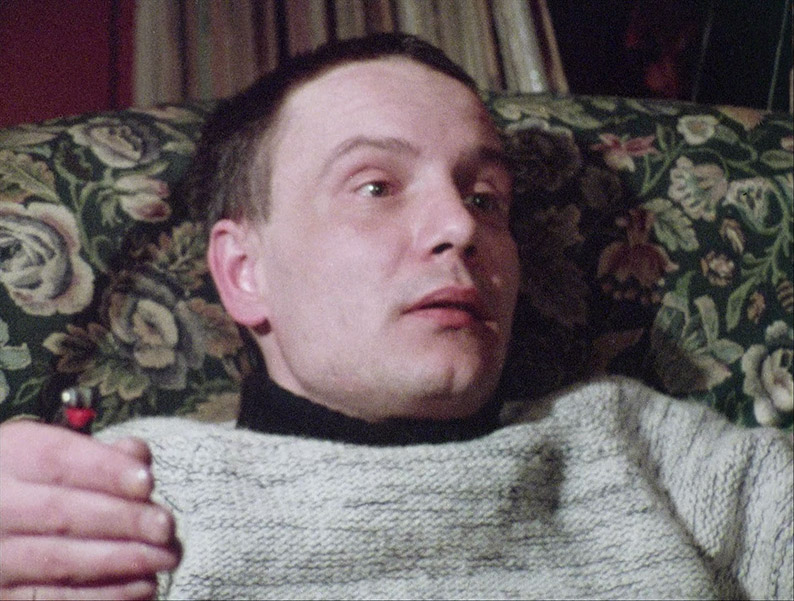
Bukovsky is a solidly made record of an event and a time that is in danger of being consigned to history, important for clarifying the full nature of psychiatric abuse and chilling in Viktor's detailed description of the drugs used on patients as methods of punishment and control. It also usefully highlights the dual standards of a British press who showed little interest in Bukovsky fate when he was in captivity, but were all over him when his release afforded him a degree of celebrity status.
| |
"The great quality that Alan had as a director, which is so rare, was to make himself as vulnerable as the actors. Very often directors want to play their role as directors and be seen to be in charge — maybe it's a fear of losing authority. But Alan placed himself on the same level as everybody else, whether in rehearsal or on location." |
| |
Actress, Eleanor Bron |
When I was growing up, the world itself behind the iron curtain was neither dangerous nor romanticized to me. Russia was a curiosity, a country (albeit a giant one) that was a part of Europe and in so many ways apart from it. The romanticizing came from more or less ‘Russian' stereotypes presented on TV and in film. There was the salt of the earth Viktor from Local Hero, the ludicrous Russian agent in The Spy Who Loved Me played by beauty Barbara Bach (even I knew at a young age she wasn't really Russian) and off course the terrifying Red Grant from the same stables' From Russia With Love. Bond probably did more to calcify the unsmiling, cigarette smoking vodka swilling hard man than any other. When the wall came down in 1989, at the stroke of a wrecking ball and a million enthusiastic hammers, the Cold War was over and Russians were our friends (probably because neither of the big players could afford the game any more). Now Russia occupies a very different political space in the world and it's not good news despite the ‘peace' we are all enjoying. In fact, it's not good news at all.
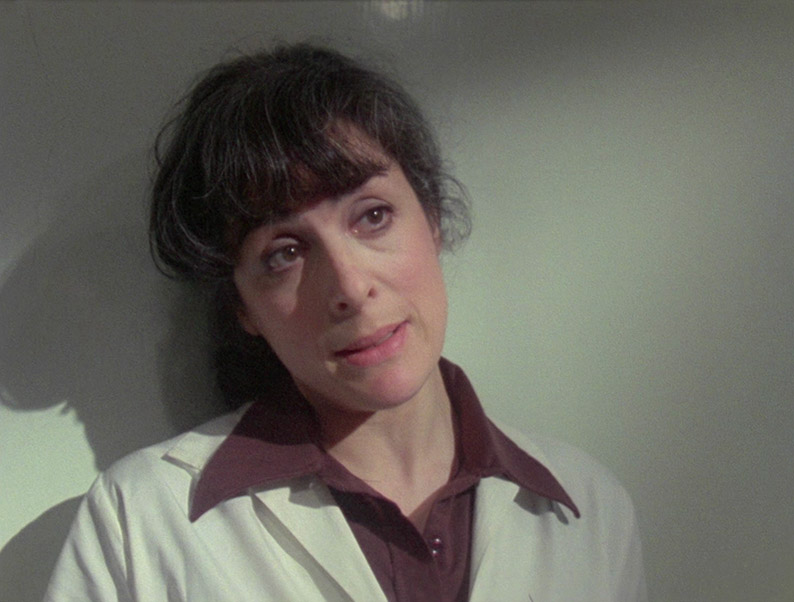
In the 60s and 70s, very brave men and women rallied against the state and for their efforts were forcibly taken off to mental institutions where they remained on sedatives unable to think, form a protest or do much of anything for an unspecified period. According to dissident and neurophysiologist Vladimir Bukovsky, the state was carrying out indefinite psychiatric imprisonment and he became well known in opposing this practice and in his earlier years he became a victim himself of the same treatment. In the world of Alan Clarke's fictional Nina, (based on ‘Marina' a friend of the writer Jehane Markham's), a disgusted doctor rebels seeing healthy and normal men and women treated in this barbaric way and despite being a mother to a growing son, the risks due to her activism deemed it prudent that she leave the country. She ended up where Bukovsky did, in the UK. Eleanor Bron has always been a romantic figure to me growing up. She was elusively infrequent in appearance but whenever she peeped out it was in material that made an impression. She was the object of Stanley's desires in the original Bedazzled (1967), Alan Bates wife in Ken Russell's Women in Love and played many comic roles flitting in and out of Doctor Who, Yes, Prime Minister and French and Saunders. Let's not forget she's the voice of BT's automated "The number you have dialled has not been recognized." To my young self, she always gave the impression of great sophistication. There was something about her that was untouchable.
As Nina, Bron gets into what seems like an adult relationship to start with (more on that in a while) as she falls for dissident Yuri, played by a young Jack Shepherd. The movie starts with Shepherd carted off to hospital and drugged against his will. Looking alarmingly like Edmund Blackadder's slightly more handsome brother from the first series of The Black Adder (I think it's the haircut), he is bearable at first as the young idealist in love desperate to write his books and change the world. As time goes on and you begin to see this young man's whole life is defined by the struggle against his former state, his faux marriage starts to crumble because his wife suddenly realises what an idiot she's pretended to marry. I cannot figure out if it's the writing that made Yuri so unsympathetic, so unreal but I was obviously recognizing something from my own life that I was not comfortable with, all those relationship tropes born from desperation. She wants to leave the room. He physically stops her and then as she sits crying on the bed, he strokes her saying "You're tired…" while I screamed, "Yeah, and you're an asshole!" It didn't get better. Yuri gets in drunk with a TV and wakes his wife up saying "I have bought food. Wake up and cook it." I know it's set in the 70s but even that casual sexism got under my skin. Nina is almost beginning to understand that Yuri's concerns are elsewhere and she's the trophy wife. "You don't care about me. All you care about is the world," she says.
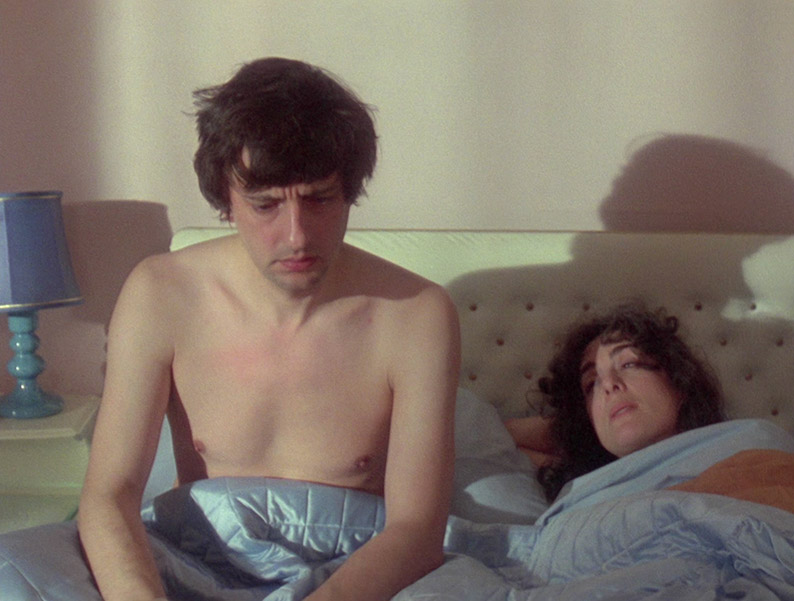
She finally breaks away from this odious creep and moves into a nice apartment donated by a friend to enable her to campaign for her son. Yuri pitches up and makes some ridiculous arguments (this is an intellectual?) proving that he's not going to win his pretend wife back with this display. It gets a little on the violent side… I confess to having no clue where Clarke was going with this. There are precious few politics dissected and pored over and Nina can be boiled down to "Two people fall in love against a politically dodgy backdrop soon forgotten, the man starts becoming an arse and the woman recognizes this." It's well worth a look for the commanding nature and assurance of the leading lady but as a snapshot of an adult relationship, it's Ryvita, a little thin and hardly nourishing.
Bukovsky was shot on 16mm on a micro-budget funded by Clarke himself and often in whatever light was available. Having failed to interest the BBC in buying the completed film, it was, according to Clarke's friend and Bukovsky cameraman Grenville Middleton, loaned out to organisations looking to raise awareness of the fate of imprisoned Russian dissidents, and at some point was simply not returned. That the BFI and Middleton managed to locate a copy at all is thus to be celebrated. That it's in far from pristine condition is not in the least surrpising – there are plenty of dust spots, more in some places than others, the occasional but very visible frame of damage, and the film has a very earthy hue. The contrast varies quite a bit, being on the aggressive side at times and then more washed out in others (the Marina Voikhanskaya interview). But things do intermittently improve and there's more picture detail in the best material than I would have expected, and there are whole stretches where the dust spots are hardly visible at all.
It turns out we nearly didn't have a soundtrack at all, and the commentary below was initially planned as a guide to what was missing, but thanks again to the efforts of Mr. Middleton, the entire soundtrack was recovered. And despite that inevitable treble bias, it's in rather good shape, with clear reproduction of the interview material, the demonstration speeches and even caught conversational clips.
From the opening shots it seems clear that Nina was also shot on 16mm film, albeit under somewhat more controlled conditions (and with a budget). Having said that – and I may be wrong here – there are a small number of interior sequences that look suspiciously like that were shot on studio cameras and recorded on analogue video. Usually the differences between the two media stick out a mile, but that's not the case here, hence my hesitance to fully commit myself on the matter. The results are a tad variable, with some variance in the punch of the contrast, the colour integrity (earthy hues again, but not seriously so) and the sharpness of the detail, which at times seems a little soft but at others is rather crisp. The image is clean and free of damage throughout.
The PCM mono soundtrack serves the dialogue well, and the mix on exterior locations is good. No problems to report.
Jehane Markham, Grenville Middleton and Sam Dunn Commentary on Bukovsky
With the recovered film still lacking a soundtrack just weeks before this commentary was recorded, the original intention was that the contributors here would explain to us what we should have been hearing. But thanks to the efforts of Graham Middleton, Clarke's friend and cameraman on this film, most of the soundtrack was restored by this point, and a broader look back at the project in general thus unfolds. Background is provided on David Markham, his involvement in political protest and his commitment to securing Bukovsky's release, while a discussion on how Alan Clarke became involved develops into one about his personality and working methods. The development of the idea and script for Nina – which Jehane Markham wrote for Clarke – is also covered here, effectively making this two commentaries for the price of one. Sam Dunn does remark in a couple of places about still missing portions of the soundtrack, but these appear to have been found and restored since this was recorded.
Bukovsky Outtakes (50:55)
There's enough unused footage to make another short film here – some is black and white, but most is in colour and almost all has sync sound. There's plenty more material of protest meetings, a couple of location interviews with Viktor and Marian, more material from Bukovsky's first press conference, and a fair amount observing life at the Markham cottage.
David Markham Interviewed by Alan Clarke (19:23)
An audio-only interview recorded, we can presume, as part of the preparation for the Bukovsky documentary, in which David Markham is questioned by Alan Clarke and talks in revealing detail about the nature of Soviet political dissent, how psychiatry is being abused in that country, how western psychiatrists have reacted to this abuse, and a good deal more. A very useful scene setter for the documentary for those not well versed in the politics and issues of the period. Us plasma TV owners salute the BFI for leaving the screen blank rather than placing an image on that would burn its way into semi-permanency over the course of the interview.
Alan Clarke's Letters to the Markhams (6:29)
Jehane Markham reads out a letter written by Alan Clarke in 1976 to her father in which he outlines his intentions for the documentary, and a second one to both of her parents in 1979 revealing how the culture shock of being in Los Angeles has affected him. Both letters are shown on screen as they are read – the lengthy first letter in particular provides a welcome insight into Clarke's planned approach to the shooting of Bukovsky (which no doubt changed dramatically once Bukovsky was released) and some will doubtless find it interesting to discover that Clarke wrote his letters completely in capitals and used the American spelling of "Thru".
Alan Clarke: Out of His Own Light (Part 7) (18:12)
The initial focus of this segment of the documentary is Alan Clarke's anarchic leanings, his reputation as a wild man and lively entertainer, and the various stories that emerged surrounding his notorious banning from the BBC bar. Former partner and writer Jane Markham then takes up the story of how her father David's efforts to free Russian dissident Vladimir Bukovsky led Clarke to make the documentary Bukovsky and the drama Nina, and also explores the process of writing the latter. As a trivial aside, it seems almost too good to be true that on a disc whose contents focus almost exclusively on Russian dissidents, the running time of this segment of the documentary is, in minutes and seconds, also the year of the ‘Patriotic War' in which Russian forces defended their homeland against Napoleon's invading Grande Armée, a victory so memorably celebrated by a certain Overture by Pyotr Ilyich Tchaikovsky.
DISC 8
| Danton's Death (1977) (94:41) |
Camus |
|
There is a story from ancient times, which is at once morbidly fascinating, horrific and ultimately just (as in the synonym of ‘fair', perhaps only just). Perillos of Athens proposed a torture device to the tyrant Phalaris; a bronze, hollow ‘brazen bull' used to, very slowly, roast a victim alive. The horrible cries would be fed through an elaborate series of tubes thereby giving the screams the sound of a lowing animal. Cute. When Perillos reveled in the telling of this ‘extra feature' to his superior, the tyrant decided to let Perillos have a turn. Justice comes in many odd forms. The tyrant himself ended up in the bull but the point of the story is to be careful what devices and laws you create for others to suffer from as the chances are that these things will catch up with you. I think the medieval phrase is being hoist by your own petard (in World War II, it would be known as blowing yourself up with your own grenade).
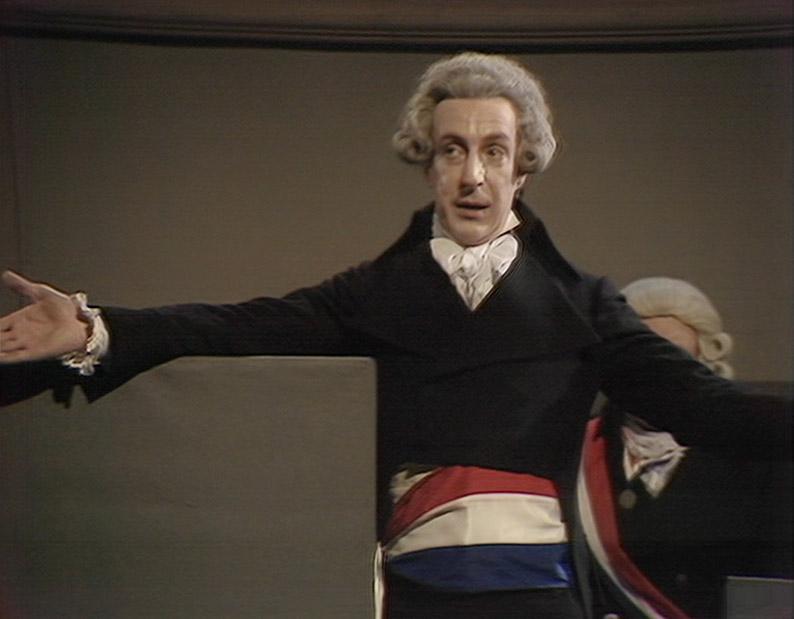
Based on the play by 19th century German writer Georg Büchner, the television production of Danton's Death charts the period between the first and second great routs of the French revolution. The inventor of the guillotine, George Danton, lives a hedonistic life seemingly immune from the law system he set in place, what was known as the ‘Committee of Public Safety'. But the fanatical and absurdly saintly Maximilien Robespierre is set against Danton as the political will and revolutionary fervour swirl around the courts looking for heads to liberate from their shoulders. The play is full of what Firefly's Captain Malcolm Reynolds might call ‘speechifying' with many arguing for their lives (or looking to kill) in a nascent court with as little social and legal foundation as a tissue in wet grass. What seems to work is Shakespearean oratory and plenty of it. Standing ovations are held back for points of rabble rousing not points of law. Trust the author to give away the ending. He may have experimented with other titles… Danton's Chemise of Demise… Danton's Check Off, Danton's… This is so disrespectful. The poor author died of typhus at twenty-three (twenty-three, Jeez) and he still left behind art and literature of great merit. I'm just not convinced that it's a perfect fit for the man who's being celebrated in this wonderful box set. Yes, it's his subject but not necessarily to be taken on in such a formal setting. I mean the TV version of Scum was his previous film. Hmm… I may have to revise this simplistic knee jerk observation.
Clarke's staging of the play is classic TV studio direction and he gives plenty of time for the actors to get their teeth into the meat of the text. Norman Rodway has a fine time as Danton going from the hero to the headless and at stages in between giving a few fine, passionate speeches as to why he should not be bereft of his second favourite organ. Ian Richardson as Robespierre is suitably oleaginous and it's a relief to know that this self-righteous prick will not only get his legal and godly comeuppance but also have his head chopped off in due course. Michael Pennington makes a horribly credible Saint Just (another whose shoulders will eventually be free of the extra weight) and Zoë Wannamaker as Lucille screams her way convincingly through the event of her husband's execution. This is not the behaviour of someone who wants to retire quietly in the Dordogne. The scream is what's known in history as the ‘please chop off my head' summons. No it isn't but the effect of expressed grief for a guilty man is to admit your own. Not healthy.
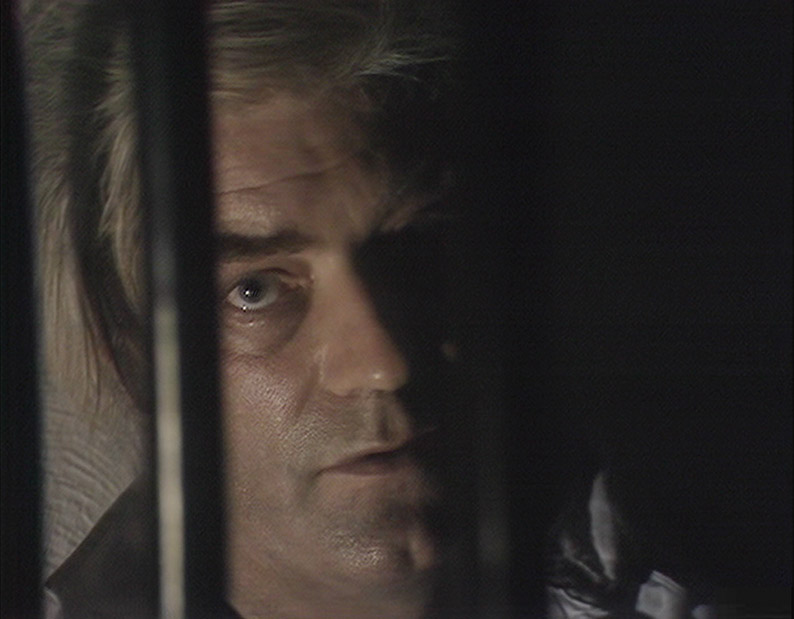
As loathe as I am to say this but the visuals don't add an element that elevates the play too much beyond a cracking Radio 4 drama. We are talking verbal arguments here and not visual swathes of emotion-eliciting imagery. I could not say with my hand on my heart that I knew this was an Alan Clarke film but the nature of the piece seems to preclude specific authorship. You either shoot it as is or you break out and make a damn movie of it. As if as an afterthought - just to gain some balance - as soon as the credits are about to roll, we hear this; "Three months later, St. Just and Robespierre were executed." Oh, OK, that's all right then. It does give the sense that life is such a fickle thing but as an Alan Clarke piece of work, we should nod with respect but not give it too much praise. Yes, I am aware at how sacrilegious that sounds, but I'm not here to praise Alan Clarke unconditionally. It is possible to adore a large percentage of his work and appreciate that even Gandhi lost his temper every now and again.
| Beloved Enemy (1981) (68:53) |
Camus |
|
"People must work for us on our terms or not at all…" |
Geoffrey Blake (Tony Doyle) of UKM Aerospace |
Based on the book Vodka-Cola by Charles Levinson (a tipple and a man after my own heart – and liver) and written by celebrated dramatist and ex-actor David Leland, Beloved Enemies is an examination and trenchant but subtle criticism of the machinations of the highest levels of corporate and political power and how those two very different gears occasionally grind but mostly mesh. An aerospace company, specializing in lasers and satellite technology (how prescient given the incoming President Regan's pet project to be soon upon us), is closing factories in the UK borne from a distrust and frustration towards what little power the unions still wielded in 1980 before Thatcher really pulled her anti-union sleeves up.
The company's primary mover, a member of the British establishment played with reptilian flair by site favourite Graham Crowden, is sounding out the Russian delegation about a state of the art tyre manufacturing factory. The ebb and flow of the deal as both sides push and pull their way to accord form the basis of the drama. Once Crowden realises that there is so much more at stake than a single factory, he mobilises his contacts and prepares the way for a massive arms deal predicated on the acceptance of some minor terms. It underlines the fact that diplomacy and tact (let's not forget low cunning) seem to be crucial ingredients in deal making between two powerful sides whose cultures are not as mutually understood as most governments would have us believe. Wouldn't it be refreshing to have two mighty countries sit at a table and spell out exactly what they wanted and reveal what compromises they were prepared to accept? Alas, the long game has to be played.
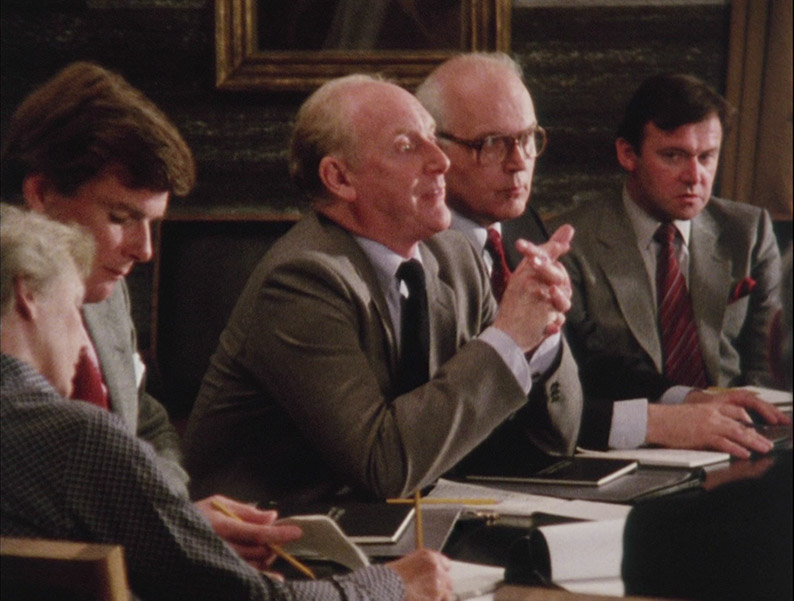
It's perhaps worth an eyebrow raise that the one character that seems to have his ethics intact until crunch time is the politician, Teddy Whitaker played by Oscar Quitak. He's such a memorable actor who never became anything like a star but his turn in the opening episodes of Yes, Prime Minister still can be recalled by this reviewer with a genuine smile of recognition… "Then, would you press the button?" A young Steven Berkoff, barely contained by his smart suit, plays the Russian envoy Kozlov whose demeanor and cunning during the ‘deal' are as oil to an engine. This character in particular obliquely asks the audience what would we do in a similar situation? I suspect that anyone with any ethics or morals would be forced to step away but as we all know politics is the art of what's possible not necessarily desirable nor morally defensible. And as The West Wing reminds us, the rules are made by those who show up. I was reminded of Roper in John Le Carré's novel and hit TV series The Night Manager. His philosophy was born from simply recognizing what a venal and nasty human world we live in and he takes advantage of that fact (that ‘fact' taken from his point of view I hasten to add) rather than doing something to dilute the corrupt state the world seems to have settled into. In fact the exact quote is: "Becoming a man is realizing it's all rotten. Realizing how to celebrate that rottenness… now that's freedom." How downright depressing that is. Spoiler ahead (for The Night Manager although it's hardly a surprise); how satisfying to have him screaming for his own freedom as his own clients ship him off to make fish food of him at the close.
Clarke's own creative contribution to this intriguing political drama, albeit one stuck in the visual rut of talking heads for almost all of its running time, is to stay out of the way and let Leland's anti-capitalist agenda drive the film. If the Steadicam had come along a few years earlier (and Clarke was able to afford it on a TV budget as he did with the far simpler but no less devastating Elephant), he would have pre-empted The West Wing's walk and talk aesthetic by several decades. As it is, he stays well out of the way and shoots with a distant, capturing spy-like eye rather than a pro-active one. There is an extraordinary scene (perhaps not for the right reasons) between Crowden and Quitak in a swimming pool. The entire conversation plays out with the actors walking ten yards and then turning and walking back. This happens too many times to stay even close to visually interesting no matter how well cut. Leland's dialogue sparkles as Crowden steps on the political gas but it's hard to imagine what other options were open to Clarke having set it in such an incongruous location. Maybe the pool was subtext for the murky waters these characters inhabit but that's a stretch even for me. Besides, the water in swimming pools is generally clean. But it's worth watching for the actors' interplay, the beautifully written script and the showing of the serious side of what was explored comically in the afore mentioned Yes, Prime Minister. It's not the best example of Clarke's singular directorial flair and originality, but a solid entry in the all too brief career of a master filmmaker.
Danton's Death was shot on analogue video on studio cameras. The image quality is very good indeed on the brighter scenes, but loses its edge a bit in the darker ones, taking the edge off the crispness and softening the black levels just a tad, something common to analogue and even digital video when the light levels drop. Damned good when the light levels allow, though. A clear mono soundtrack once again carries the dialogue well, from the quieter whispers to the outraged shouts.
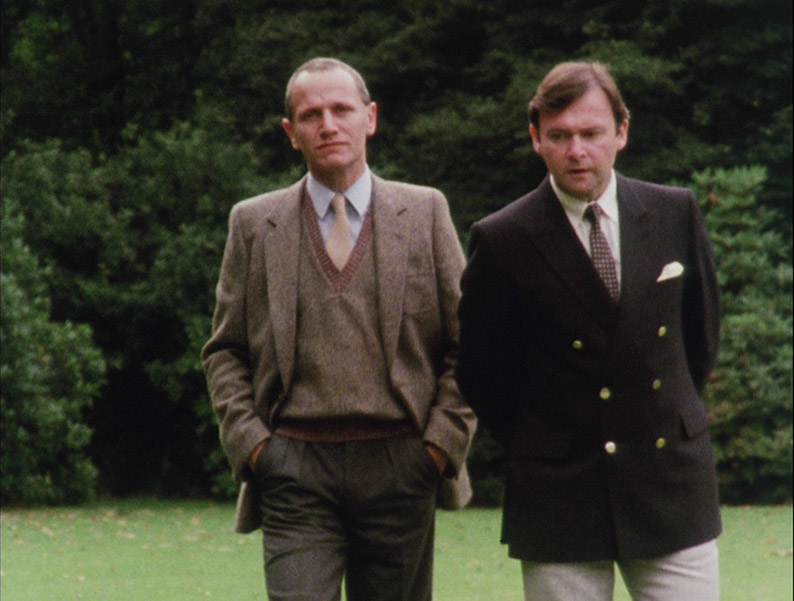
Beloved Enemy was shot on 16mm film, sometimes in settings that must have given cameramen Elmer Cossey and Barry McCann the heebie-jeebies – wide shots of dark suited men conferring in glumly lit, dark walled rooms – but the content is always clearly visible. That familiar earthy hue that you'll find on so many film-shot TV productions of the period (is this down to how they have been stored over the years?) is evident throughout, but teh contrast has bite and the level of detail is rather good. The soundtrack is clear – once again, the dialogue is all important here, but the location sound effects and ambient sound are also cleanly rendered.
Alan Clarke: Out of His Own Light (Part 8) (19:46)
The focus of this segment of the documentary is exclusively the two films featured on this disc, with equal running time given to each. In the first half, set designer Stuart Walker recalls the challenges he faced on Danton's Death, some of which grew out of Clarke's determination to shoot all of the facial close-ups with long lenses to achieve a narrow depth of field. He reveals that the whole thing was rehearsed and shot in just 3 days, and describes Clarke a gentle and inspirational man with a great sense of humour and the best person he ever worked with. In the second half, David Leland talks about the genesis and writing of Beloved Enemy, with contributions from Jeanne Markham and editor Tariq Anwar. I particularly enjoyed Leland's recollection of Clarke's reaction to actors changing his dialogue: "Why have you changed it? You think you're a better writer than him? I've employed him to write it, I've employed you to act it."
|